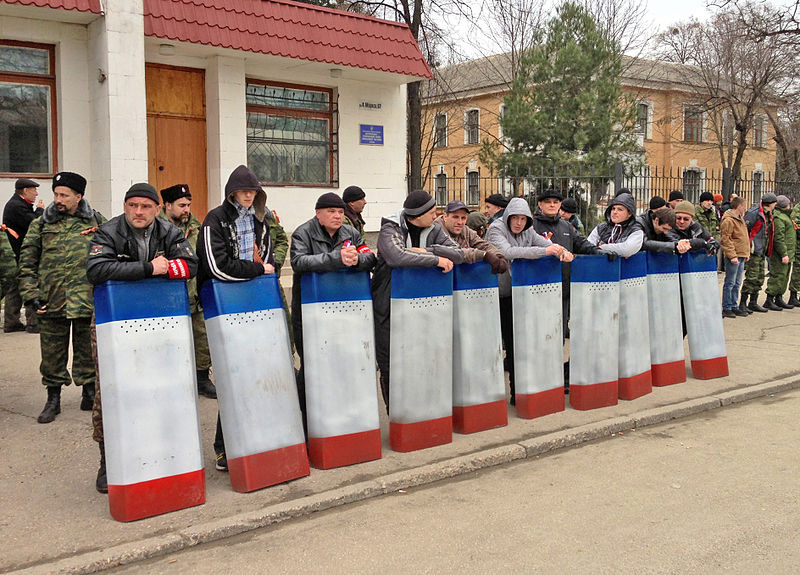 The Crimean parliament has voted to organize a referendum on March 16 if the Russian government — basically Putin — agrees that the territory is eligible to become part of the Russian Federation and to secede from Ukraine.
The Crimean parliament has voted to organize a referendum on March 16 if the Russian government — basically Putin — agrees that the territory is eligible to become part of the Russian Federation and to secede from Ukraine.
But here’s the problem:
According to Article 73 of Ukraine’s constitution, only national — not local — referendums can decide the status of territories within Ukraine.
And Article 72 stipulates that referendums shall be “called by” the national parliament (Verkhovna Rada) or the president.
Here’s what else this article states: Referendums can be held only if 3 million citizens sign a petition supporting it, and if the petition gains a minimum of 100,000 signatures per region (oblast) in at least two thirds of Ukraine’s regions.
These two articles were doubtless designed to prevent exactly what’s now unfolding in Crimea: the possible breakup of the country as a result of regions deciding to secede or to become part of another state after staging local votes.
It’s a safe bet that those who drafted these constitutional provisions had Crimea specifically in mind.
A peninsula jutting into the Black Sea, Crimea has a Russian majority of nearly 59 percent (24 percent are Ukrainians, 12 percent Tatars), and its port of Sevastopol is, under a long-term lease, home to Russia’s Black Sea naval fleet.
Moreover, in 1954 Crimea was transferred to Ukraine, then the Ukrainian Soviet Socialist Republic, by Soviet leader Nikita Khrushchev in a move that Russian nationalists now claim was invalid.
So Crimea is small in size but large in strategic significance.
Let’s wait and see how Putin responds to the Crimean parliament’s vote. It won’t take long.
Will he say that Russia must follow the letter of the law (in this instance the constitution of Ukraine) and can’t therefore bless the proposed referendum in Crimea?
In a recent interview Putin said he had no intention of annexing Crimea. Moreover, Russia, along with the United States and Britain, is party to a 1994 agreement — the Budapest Memorandums on Security Assurances — to respect Ukraine’s territorial integrity.
Or will Putin back the proposed referendum, claiming that he supports the universal principles of freedom and self-determination and will respect the will of Crimea’s inhabitants if they opt to join the Russian Federation? (Incidentally, the vast majority of Crimea’s Ukrainians and Tatars will vote to remain within Ukraine if there is a referendum.)
The current, pro-Russian, leadership in Crimea emerged after soldiers in unmarked uniforms took over the parliament building (along with other civilian and military installations) on Feb. 27. This is the group that has now apparently decided to make the peninsula part of Russia.
Here’s the thing: Putin insists that Ukraine’s current government is unconstitutional because it came to power after mass protests drove a legitimately elected president, Viktor Yanukovych, from office. By that reasoning, however, Crimea’s new government must be illegal as well, given how it took office.
But this crisis is not about the logic of constitutional law.
What Putin really wants is to ensure that Yanukovych’s fall does not result in Ukraine’s drift away from Russia and alignment with Europe and the United States.
Like many Russians, Putin sees Ukraine as properly part of Russia’s sphere of influence. And he’s convinced that the West (and the United State in particular), no matter its publicly professed principles, is out to undermine Russia’s standing and security.
If Putin can’t prevent Ukraine from aligning with the West, he’s determined to make life for its new government as hard as possible — and in lots of ways.
One way would be to annex Crimea.
The outcome of Crimea’s crisis will be determined by the mathematics of power, no matter the highfalutin legal and moral verbiage being spewed by the various countries and organizations involved in it.
That much is certain despite all the unknowns about Ukraine’s future.
Image: A Crimean self-defense group with shields painted as the flag of the autonomous republic, Simferopol, Ukraine, March 2, 2014 (Photo: Elizabeth Arrott/VOA)
